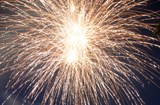Fireworks Safety
When it comes to the Fourth of July, celebrations would seem lacking without fireworks. We all know that most fireworks are dangerous, but even sparklers burn at temperatures up to 2000 degrees.
Taking proper safety measures when handling any type of firework—no matter how harmless it seems—can help prevent injuries. Consider the following facts about firework use in the United States:
- In 2013, approximately 11,400 people injured themselves from fireworks.
- About 65% of these incidents occurred between June 21 and July 21.
- Children younger than 15 years of age accounted for about 40% of firework injuries in 2013.
- There were approximately 2,700 more firework-related injuries in 2013 compared to 2012.
- Sparklers were involved with 31% of the estimated injuries in 2013.
What’s Legal in Florida?
Floridians should use only consumer fireworks permitted by state law and approved and listed by the State Fire Marshal. In Florida, legal devices include sparklers, cones, fountains, and some aerial items.
State law permits fireworks which:
- emit a shower of sparks upon burning,
- do not contain any explosive compounds,
- do not detonate or explode,
- are handheld or ground based,
- cannot propel themselves through the air, and
- contain no more than 100 grams of the chemical compound that produces sparks upon burning.
Novelties and trick noisemakers, including snakes, smoke devices, poppers, booby traps, and snappers, are also permitted.
Florida law prohibits the following items:
- Firecrackers
- Torpedoes
- Skyrockets
- Roman candles
- Dago bombs
- Any fireworks that contain any explosive or flammable compounds.
Safety Tips
To ensure your holiday does not include an unexpected trip to the emergency room, follow these guidelines:
- Consider leaving fireworks to professionals, and watch a public display.
- Use fireworks outdoors only (but not near dry brush or grass).
- Obey state and local laws.
- Always have water or a fire extinguisher handy.
- Only use fireworks as intended. Read and follow the label directions.
- Make sure an adult is always present to supervise firework activities.
- Keep young children away from all fireworks.
- Never relight or stand over a "dud" firework. Put it out with water.
- Do not use homemade fireworks or illegal explosives.
Adapted and excerpted from:
“Fireworks Information Center,” US Consumer Product Safety Commission (Accessed 06/2014).
“2013 Fireworks Annual Report,” US Consumer Product Safety Commission (06/2014).
"2013 Florida Statues: Sale of Fireworks," The Florida Legislature (Accessed 06/2014).


